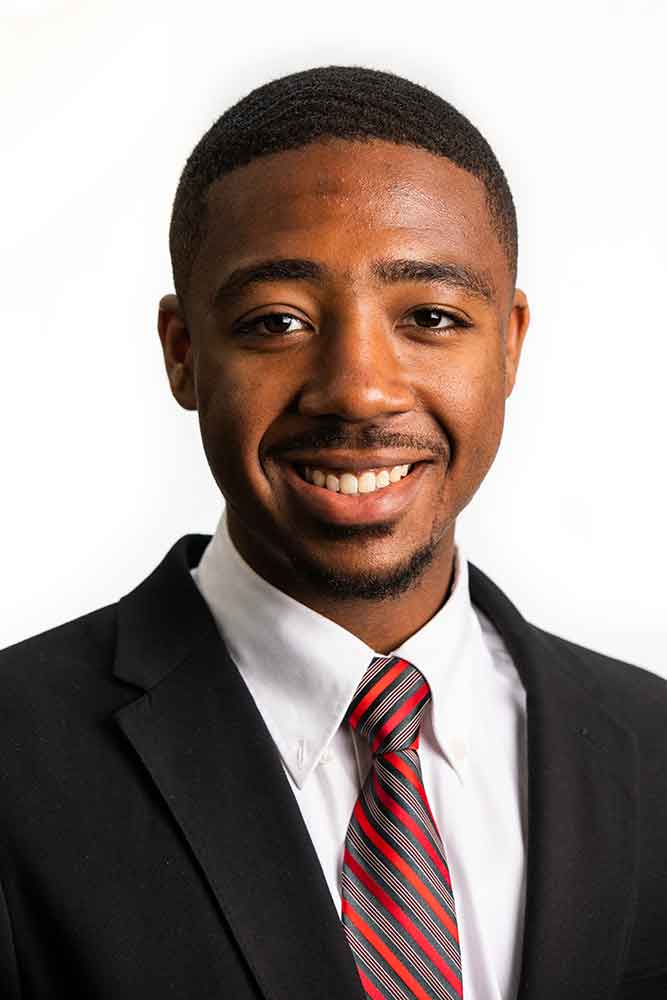Meet a Fellow: Cameron Brown
Budding Geoscientist Developed Skill Set for Future in Energy Industry

Undergraduate Cameron Brown participated in the Mickey Leland Energy Fellowship Program to gain experience and become a petroleum geologist. During his recent fellowship, Brown helped create computational simulations of fluidized beds to limit the harmful impacts of oil and gas emissions on the environment and human health.
Cameron Brown, a junior mathematics and geoscience major at Fort Valley State University, discovered the Mickey Leland Energy Fellowship (MLEF) Program while attending a conference of the National Association of Black Geoscientists (NABG). At the conference, a former MLEF participant presented research from a recent fellowship, and Brown decided such an experience would be a great opportunity for him to apply his degrees in the energy industry and develop a relationship with the U.S. Department of Energy (DOE).
The MLEF Program provides students with fellowship opportunities to gain hands-on research experience with the DOE Office of Fossil Energy. The program’s mission is to strengthen and increase the pipeline of diverse future science, engineering, technology and mathematics (STEM) professionals.
For the 10-week fellowship, Brown was stationed at the National Energy Technology Laboratory in Morgantown, West Virginia, where he studied the flow of a gas or a liquid through a bed of solid particles.
“The most surprising part of this process was that the bed of solid particles behaved like a fluid when this occurred,” Brown said. His daily routine was computationally intensive and consisted of utilizing the computational fluid dynamics (CFD) code MFIX and the post-processing software ParaView to conduct simulations of fluidized beds and view the numerical results.
Brown’s research, conducted under the guidance of his mentor, Sofiane Benyahia, Ph.D., focused on the validation of a continuum turbulence model for coarse multiphase flow simulation. Simulations provide an alternative way for visualizing equations that model the laws for the conservation of mass and momentum.

The overall goal of Brown’s research during his time with the MLEF Program was to create a computational simulation of a fluidized bed that has a low processing time and a high resolution. His research has several applications useful to the oil and gas industries. In these industries, engineers and geoscientists use fluidized beds to remove impurities as oil and gas are collected from the reservoirs. The ability to remove impurities, such as carbon dioxide and carbon monoxide found naturally in oil and gas, plays a major role in reducing the harmful impacts on the environment and human health.
“My favorite part of the MLEF Program was learning what researchers do behind the scenes and conducting research focused on facilitating processes to improve the energy industry,” Brown said.
As a participant, Brown improved his knowledge of advanced software programs. He presented his research at the National Technical Association and the National Conference of Undergraduate Research. Also, he placed second at Fort Valley State University’s Research Day for his presentation on his MLEF research.
“The MLEF Program served as a great platform for me to meet other students from across the country and exchange thoughts and ideas about research and career goals,” Brown said.
After his experience in the MLEF Program, Brown accepted an internship in Canberra, Australia, to conduct research by analyzing the movement of tectonic plates around the continent. Brown will return to Fort Valley State University after his internship in Australia to complete his undergraduate studies. He serves as the president of university’s chapter of the NABG, and he also mentors middle school students through a STEM program called Star Base 2.0.
“Ultimately, I am focused on earning as much experience as possible to improve my marketability to potential employers in the oil and gas industry. My overall career goal is to become a petroleum geologist,” he said.
The MLEF Program is administered by the Oak Ridge Institute for Science and Education (ORISE) for the U.S. Department of Energy. ORISE is managed for DOE by ORAU.